S.A. Bradley Discusses Why We Love Horror
S.A. Bradley discusses why we love horror
BONUS: His list of best Christmas horror movies
By Angelique Fawns
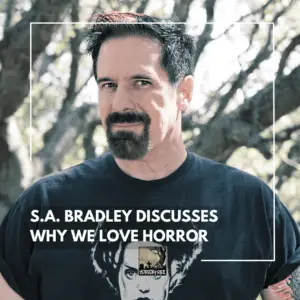 What is beneath the chills and thrills? Why do we love horror? I attended a Fyrecon writing class this October with S.A. Bradley called How Horror Performs “Cultural Shadow Work” and he had me enthralled. The presentation focused on how allegory and metaphor in our favorite horror movies and books help a society heal. Bradley is also the brain child behind Hellbent for Horror, an award-winning podcast where he discusses everything horror. He’s in high demand for his live shows and book readings, but he took the time to sit down and discuss our favorite subject with us here at Horrortree. Of course…. horror.
What is beneath the chills and thrills? Why do we love horror? I attended a Fyrecon writing class this October with S.A. Bradley called How Horror Performs “Cultural Shadow Work” and he had me enthralled. The presentation focused on how allegory and metaphor in our favorite horror movies and books help a society heal. Bradley is also the brain child behind Hellbent for Horror, an award-winning podcast where he discusses everything horror. He’s in high demand for his live shows and book readings, but he took the time to sit down and discuss our favorite subject with us here at Horrortree. Of course…. horror.
AF: How did you first discover horror?
S.A. B: I like to call that moment the “First Kiss” with horror. It’s that moment when a horror movie makes such an impression that you’ll either never watch another one or you’re hooked for life. It usually happens when we sneak in to see a movie we shouldn’t have watched when we were too young to be watching it in the first place.
My “First Kiss” was Nicolas Roeg’s DON’T LOOK NOW (1974) when I was 8 years old. I was left unattended, and Home Box Office was playing on the television. That surreal opening sequence with the drowning girl put me in a state of shock. I had nightmares for three nights and I refused to tell my father what gave me them. It was my secret. The movie scared me, but I needed to see that opening scene again. Once I did, I felt much better. I think breaking the rules and seeing something forbidden is a rite of passage that horror gives us. We take the dare, and the world doesn’t end, and we come out a little braver.
AF: Do you have a day job or is the being “the champion of horror” a full-time pursuit?
S.A. B: It’s become a full-time obsession. I worked as a technical recruiter for start-up software companies in Silicon Valley for a decade. It was intense and fast-paced work that paid well, but it also took over my life. One day I realized that I spent all my time using my communication skills to voice other people’s passions, and I decided it was time to give voice to my own.
AF: You host a podcast called “Hellbent for Horror”, can you talk to me about that and how it found its audience?
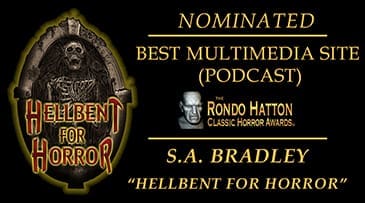 S.A. B: “Hellbent for Horror” is a podcast devoted to all things horror, where I talk about movies, books, music, and historical events that shaped me and also shaped the culture. I have essay-driven episodes where I take a theme, like obsessions or phobias, and discuss three or four horror films that deal with that theme. Other episodes are interview-based, where I have guests on to discuss a theme and films of interest. I started in 2016, and the first dozen episodes were essay-driven shows I promoted on Facebook and Twitter. Folks found the podcast on iTunes and other outlets, and I started getting emails from folks who really connected with what I had to say. Many of them were really smart and knowledgeable horror fans, so I started asking some of them if they wanted to be guests on the show. Little by little, folks started to share my show with friends. Somewhere along the way, I started getting a small but rabidly dedicated following. I just kept talking, and folks found me.
S.A. B: “Hellbent for Horror” is a podcast devoted to all things horror, where I talk about movies, books, music, and historical events that shaped me and also shaped the culture. I have essay-driven episodes where I take a theme, like obsessions or phobias, and discuss three or four horror films that deal with that theme. Other episodes are interview-based, where I have guests on to discuss a theme and films of interest. I started in 2016, and the first dozen episodes were essay-driven shows I promoted on Facebook and Twitter. Folks found the podcast on iTunes and other outlets, and I started getting emails from folks who really connected with what I had to say. Many of them were really smart and knowledgeable horror fans, so I started asking some of them if they wanted to be guests on the show. Little by little, folks started to share my show with friends. Somewhere along the way, I started getting a small but rabidly dedicated following. I just kept talking, and folks found me.
AF: You are one of the most articulate and polished public speakers I’ve ever met. How did you learn/perfect this skill? Any secrets?
S.A. B: I have a very weird background and upbringing. I was raised in a fundamentalist Christian cult which had me preaching and evangelizing at a very young age. Almost every day was immersion and church services. The church leaders taught me how to speak in public with authority at the ripe old age of 8 and how to use gestures and pauses effectively to draw in folks. And they used to grade me on this stuff. They would have me do 5-minute pulpit sermons on specific bible verses, and I’d get a report card after church. They also inadvertently taught me the art of debating because I went to a public school where I’d have to defend my family’s beliefs to the other kids. This was an aggressive, in-your-face religion, and the irony is that the debate skills they gave me were the tools that made me rebel against the cult. It didn’t hold up to scrutiny. By my teens, all my debate and oration skills were used to voice strong opinions around my love of heavy metal, punk, and, most of all, horror. As you can tell here, I’m a natural talker, but I’m also an avid reader, and I do believe that reading helps your speaking voice. You can learn rhythms and flow of dialogue from both fiction and non-fiction books. That natural voice helped me through many jobs, including technical recruiting.
The biggest skill is to be passionate. I can be at a convention and talk about horror for 6 hours straight because I LOVE THE SUBJECT. To me, the main reason to do any of this is to share my love and passion with others. When I was recruiting, I was passionate about bringing smart folks together for a common cause. I also needed to believe in the company, and I needed to love what they wanted to make or do. Horror fans are hungry for knowledge and a new movie to fall in love with, and we all love to share what we know and what excites us. Half of the joy is sharing the love with someone else.
AF: How does your background in the U.S. Airforce and as a firefighter influence your understanding/love of horror?
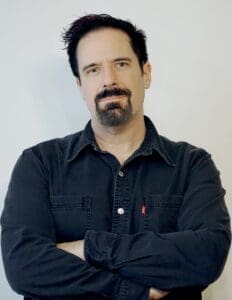 S.A. B: Interesting question, one I’ve never been asked before. I guess if there’s anything that being in the military did for my understanding of horror was that it introduced me to a much broader and more diverse world than I knew in my hometown in the Pennsylvania Coal Country. I met people from all types of backgrounds and heard how different regions have different boogeymen. One big thing that being a firefighter in the USAF brought to the table was a fascination with death and gore. Death or disfigurement was always a possibility in that line of work, and we were living on a base with nuclear missiles on it, so we leaned into it with “gallows humor.” We loved trying to gross each other out or playing scary pranks on each other. We tried to be “Born Again Hard” to pretend we were unshockable. I was tasked with bringing the goriest, nastiest horror films into the station. The over-the-top gore and crazy monsters gave us an outlet to laugh and groan away the real-life tension we had, and it helped give us one more thing to bond over.
S.A. B: Interesting question, one I’ve never been asked before. I guess if there’s anything that being in the military did for my understanding of horror was that it introduced me to a much broader and more diverse world than I knew in my hometown in the Pennsylvania Coal Country. I met people from all types of backgrounds and heard how different regions have different boogeymen. One big thing that being a firefighter in the USAF brought to the table was a fascination with death and gore. Death or disfigurement was always a possibility in that line of work, and we were living on a base with nuclear missiles on it, so we leaned into it with “gallows humor.” We loved trying to gross each other out or playing scary pranks on each other. We tried to be “Born Again Hard” to pretend we were unshockable. I was tasked with bringing the goriest, nastiest horror films into the station. The over-the-top gore and crazy monsters gave us an outlet to laugh and groan away the real-life tension we had, and it helped give us one more thing to bond over.
AF: Tell us about your book Screaming for Pleasure. How was it received? Do you have another book in the works?
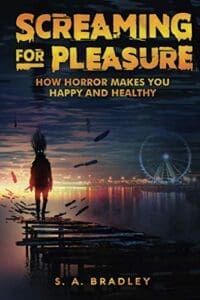 S.A. B: “Screaming for Pleasure: How Horror Makes You Happy and Healthy” is a love letter to all things that go bump in the night, and how horror not only reinvents itself to reflect each generation’s anxieties but can also be healing as well as thrilling. It shows how our culture informs our horror movies, and how our horror movies inform our culture. The book opened to mostly positive reviews and slowly built a word-of-mouth readership that grew beyond the podcast reach. Three years later, the book still gets discovered by readers and book critics alike and has been included in “best of” lists and won a few readers’ choice awards.
S.A. B: “Screaming for Pleasure: How Horror Makes You Happy and Healthy” is a love letter to all things that go bump in the night, and how horror not only reinvents itself to reflect each generation’s anxieties but can also be healing as well as thrilling. It shows how our culture informs our horror movies, and how our horror movies inform our culture. The book opened to mostly positive reviews and slowly built a word-of-mouth readership that grew beyond the podcast reach. Three years later, the book still gets discovered by readers and book critics alike and has been included in “best of” lists and won a few readers’ choice awards.
And I am working on another book as we converse here! This one will celebrate horror from high to low while delving into why horror fans are so loyal, how monsters are metaphors for our cultural dark shadows, and how there is a horror film out there for everyone’s tastes.
AF: You have a unique take on horror and how it serves a purpose in society. Can you touch on that?
S.A. B: Sure. The horror movie is tailor-made to use allegory and metaphor to discuss uncomfortable real-life subjects safely by giving us emotional distance from the darkness. When we use a monster as a stand-in boogeyman for the real monsters out there, we get to release some of the anxiety that the modern world builds up inside all of us. I tell people there’s no way I would watch a movie about the January 6th Insurgency, but I probably would watch a movie where werewolves attacked Congress. We’d still know what those werewolves represented. Allegories allow us to feel emotions without needing to get into philosophical debates. You can still have those debates, but it’s not compulsory at the moment. Yet, I find that horror always comments on the sore spots in society, whether we are ready to accept it or not.
AF: You also have an opinion on Horror and Happiness. Can you explain?
S.A. B: Horror works on the shadow self, the Jungian shadow, that every person has inside them. Jung states that we need to acknowledge the shadow within us, and I see horror as a safe handshake with that dark side. Horror works like music does. You feel music before you intellectualize it. You go back to the music afterward to think about why it affected you, but the first brush with it is totally visceral. One note of music can change your mood, and horror works the same way. Art doesn’t need to be logical to be emotionally powerful, but art can’t exist without an emotional connection. The same goes for horror movies. They let us confront and accept the dark parts of ourselves, they also give us a sense of play, and they help us find our clan of folks who revel in it as much as we do!
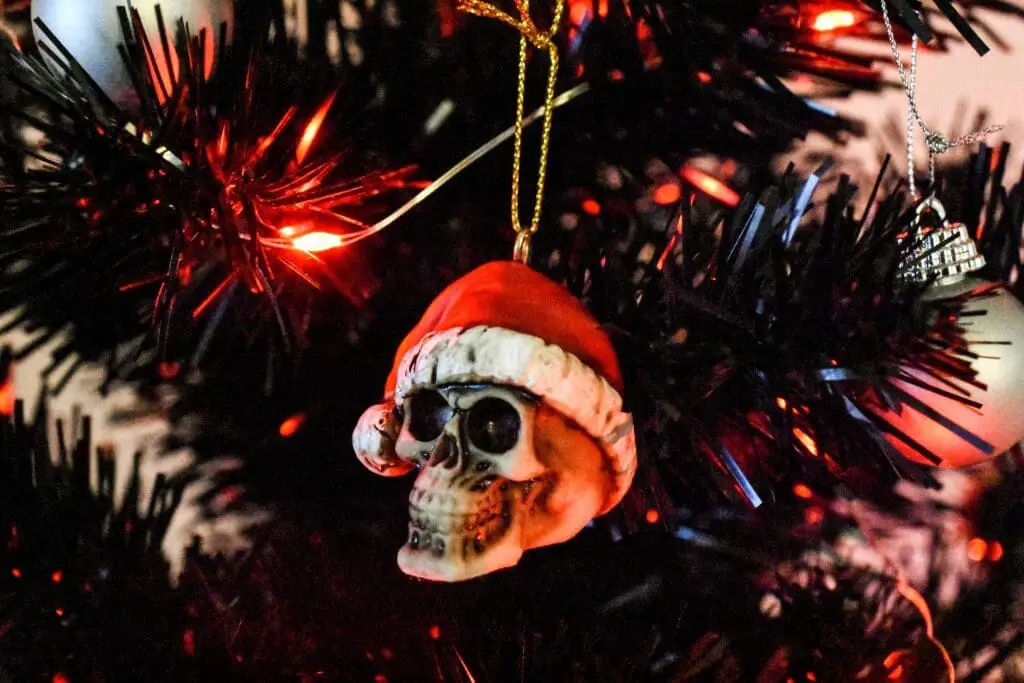
Photo by Hello I’m Nik on Unsplash
AF: I find I enjoy horror, especially during the holidays. Is there a reason horror is so appealing at the most festive time of the year?
S.A. B: Horror goes with the spirit of Christmas like spiced rum goes with eggnog. Monsters, ghosts, and the supernatural were key figures of the holiday season long before the word Christmas even existed, and they still are. Winter solstice, the shortest/darkest day of the year, was considered a time when the “veil” between the worlds of the dead and the living was very thin. Dead ancestors were addressed in scary tales told around the fire. The longest nights and darkest days were times to huddle everyone close and remember that life is hard, dangerous, and short. As Christianity took hold, many of the pagan customs and the presence of ghosts remained. Shakespeare’s “A Winter’s Tale” takes place at the winter solstice and features sprites and goblins. Christopher Marlowe’s “The Jew of Malta” speaks of spirits and ghosts that glide by night. And then, on December 19, 1843, Charles Dickens published a novella that capitalized on a revival in rural England around the holiday traditions. The title of the book was “A Christmas Carol. In Prose. Being a Ghost Story of Christmas.” Telling ghost stories on Christmas Eve became a tradition in England, and it was Charles Dickens who popularized it. He regularly included ghost stories, like “The Seven Poor Travelers,” “The Chimes,” “The Haunted Man,” and “The Signal-Man” in the Christmas issues of magazines like Household Words and All the Year Round.
The British have kept that tradition of Christmas Ghost Stories throughout the decades. You can even see it in the Doctor Who Christmas specials, which almost always deal with ghosts. We horror fans are keeping in line with a long-honored literary and cultural tradition!
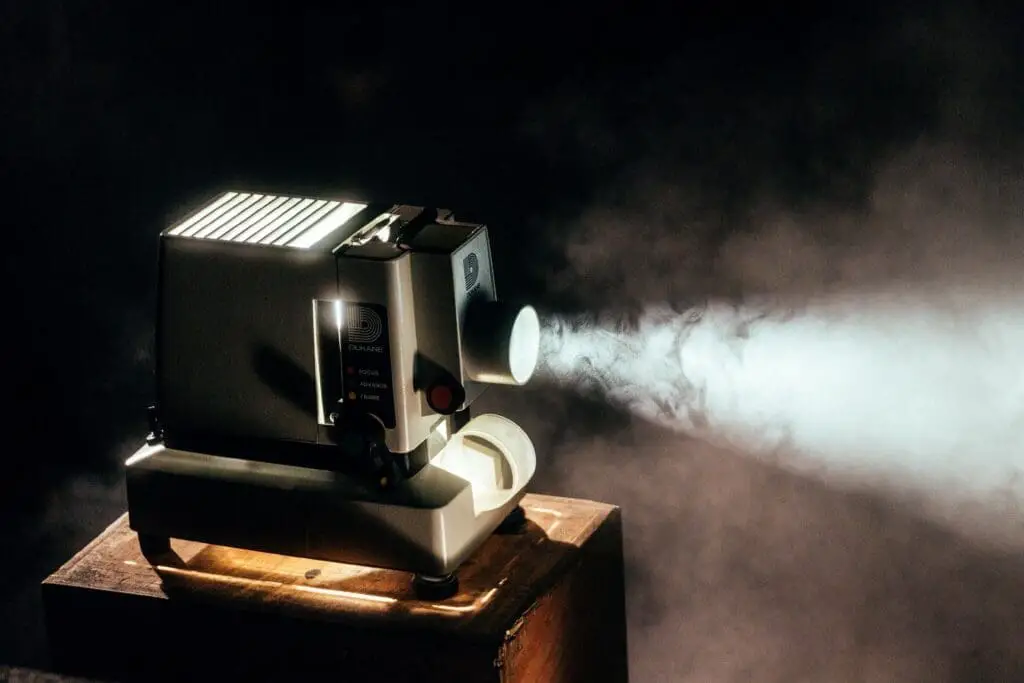
Photo by Jeremy Yap on Unsplash
AF: What movies do you recommend for horror fans looking to indulge during the holiday?
Well, I’ll give a shameless plug to my Hellbent for Horror podcast episode 27 (https://hellbentforhorror.com/podcast-episodes/2016/12/24/episode-027-you-better-watch-out-christmas-horror-movies) where I list quite a few of them, and I also want to mention that I do an annual episode where I read a Christmas Ghost Story.
But, for the sake of this article, here are a few Christmas horror movies that I think are some of the best:
Krampus (2015)
Michael Dougherty’s movie about a boy who accidentally summons the demon for Christmas to deal with his horrible relatives has much promise. The look of Krampus himself, with a death mask of an eyeless Santa, is worth the price of admission. The movie gleefully skewers family holiday anxiety, but I wish it went further into the anarchic darkness that Krampus represents. Search out the “Naughty Cut” extended version if you’re a real freak (like me).
Rare Exports: A Christmas Tale (2010)
This Finnish gem has the Old-World pagan folklore collide directly with the more modern Christian mythos in a story where an archaeological dig might have just unearthed the tomb of the “real Santa Claus”. What pops out of the tomb stands holiday tradition on its head. This movie has a satirical premise about how we bury our dark history under new history to commodify it, but when the monsters get revealed, the movie takes itself deadly serious.
Sint (2010)
Killer Santa” movies think they are transgressive, but Sint (Saint) delivers the goods. More accurately, this is a “Killer Sinterklass” movie that openly mocks the revisionist folklore and cultural appropriation of the Americanized Saint Nicholas. This movie makes up its own wildly subversive history that makes Sinterklass into a murderous apostate who comes back from the grave specifically to kill off children. Did I say this was transgressive? There is some really biting social commentary in this Yuletide Slasher, but the copious gore and body count will have you picking your jaw off the ground.
A Christmas Horror Story (2015)
This anthology of short horror vignettes will sneak up on you and freeze you in your tracks. A jolly radio host tells us ghost stories on Christmas Eve, just like the old tradition. Each of these stories is creepy, but the real horror comes from the how the wraparound story brings the vignettes together into a terrifying social commentary. A bonus: if you’re a monster fan, there is a fantastic beast in this film, too!
The Children (2008)
Just like children are the central focus of the Christmas Holiday, children are ground zero for Christmas Horror movies, too. Most of the time it’s a threat to the children that drives the anxiety. But what if the threat came from the children themselves? Two families spend Christmas together, but the vacation house becomes a hunting ground as the children turn on their parents.
AF: What is in the future for S.A. Bradley?
S.A. B: As well as finishing the new book, I’ll also be lecturing on January 19th at the College of Idaho on “Monsters are Metaphors: How Horror Does Cultural “Shadow Work” and a second lecture called “My Horror Manifesto,” I’ll also be lecturing at the University of the Pacific on February 1st, and there will be a dozen or so convention
S.A. Bradley
Podcaster/Writer/Speaker -Hellbent for Horror
https://hellbentforhorror.com/book
https://www.facebook.com/hellbentforhorror/
https://twitter.com/hellbenthorror
- About the Author
- Latest Posts
Angelique Fawns writes horror, fantasy, kids short stories, and freelance journalism. Her day job is producing promos and after hours she takes care of her farm full of goats, horses, chickens, and her family. She has no idea how she finds time to write. She currently has stories in Ellery Queen, DreamForge Anvil, and Third Flatiron’s Gotta Wear Eclipse Glasses. You can follow her work and get writing tips and submission hints at http://fawns.ca/.












